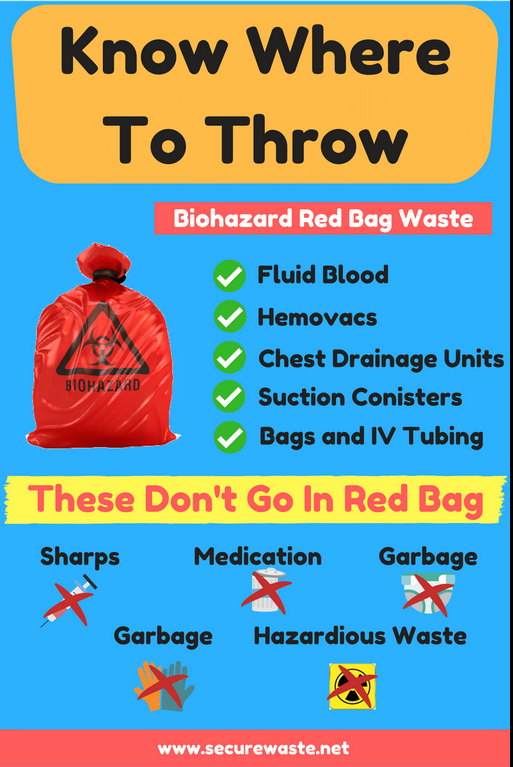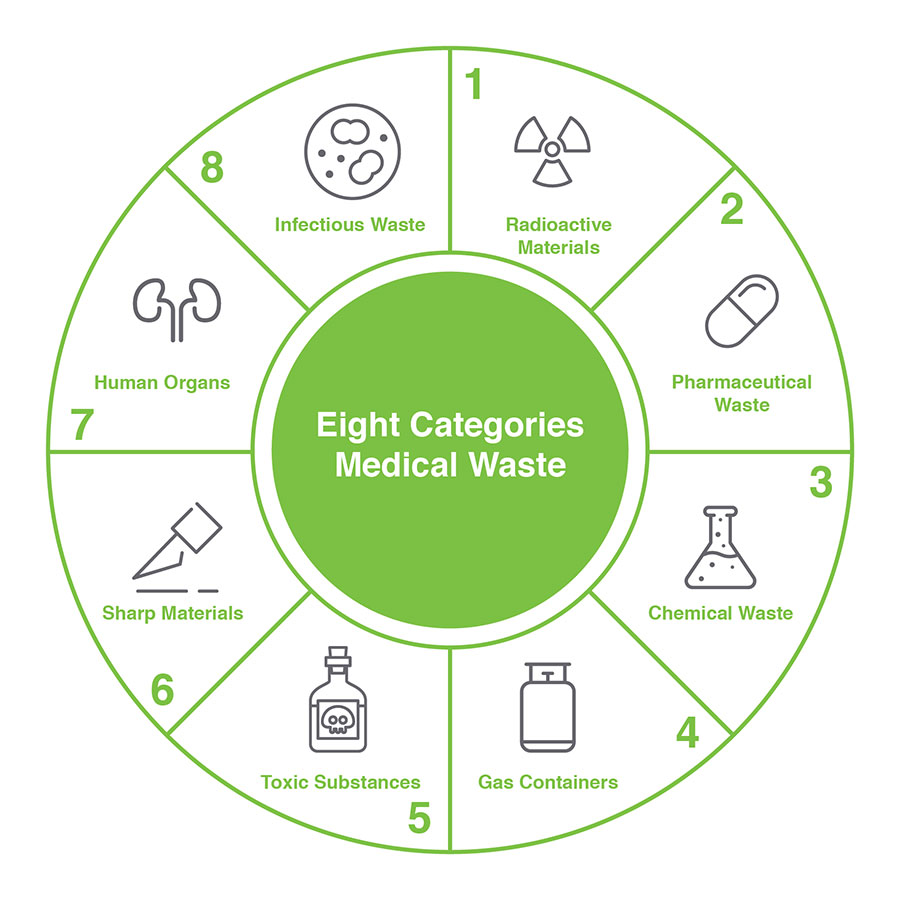Proactive Health Solutions: Choosing the very best Medical Waste Removal Near You
Proactive Health Solutions: Choosing the very best Medical Waste Removal Near You
Blog Article
Stay Ahead of Rules: Expert Suggestions on Medical Waste Disposal
In a world where the healthcare industry is constantly evolving, it is crucial for medical facilities to remain ahead of policies when it comes to the proper disposal of medical waste. From recognizing the various classifications of medical waste to executing the right collection and partition techniques, this discussion will certainly supply actionable tips and useful insights to aid centers stay in advance of policies in the ever-changing landscape of clinical waste disposal.
Comprehending Clinical Waste Categories
Comprehending medical waste classifications is necessary for proper disposal and monitoring in health care facilities. Clinical waste refers to any type of waste generated by health care activities that might pose a hazard to public health and wellness or the atmosphere. It is vital to classify medical waste properly to ensure its secure handling, treatment, disposal, and transport.
There are a number of groups of medical waste that medical care facilities need to be aware of. The most usual categories consist of infectious waste, pathological waste, sharps waste, pharmaceutical waste, and chemical waste. Each group has specific standards and regulations for its appropriate management and disposal.
Contagious waste includes products polluted with blood or various other bodily liquids, such as gloves, dress, and laboratory societies. Pathological waste refers to human tissues, body organs, or body components that call for special delivery and disposal. Sharps waste includes utilized needles, syringes, and other sharp things that can trigger injury and transfer infections. Pharmaceutical waste makes up ended, unused, or infected drugs that require mindful handling and disposal. Chemical waste consists of solvents, anti-bacterials, and various other chemical materials made use of in medical care centers.
Staying Up-To-Date With Regulatory Adjustments
Remaining existing with regulatory adjustments is vital for healthcare facilities to make sure conformity and proper administration of clinical garbage disposal. medical waste removal service. With policies regularly evolving, it is necessary for healthcare centers to remain updated to avoid fines, penalties, and potential injury to the setting and public health and wellness
To stay in advance of governing modifications, health care facilities should develop a system for surveillance and monitoring updates. This can be done by signing up for governing e-newsletters, attending workshops and seminars, and actively taking part in market associations. In addition, centers should mark an employee or group in charge of staying educated and sharing info to appropriate stakeholders.
Regular communication with governing firms is likewise essential. Healthcare centers should establish partnerships with regional, state, and federal agencies to ensure they understand any adjustments in regulations that may influence their waste monitoring methods. This can be done through routine conferences, participation in public remark periods, and aggressive engagement with regulative firms.
In addition, medical care facilities should think about partnering with waste management firms that focus on medical garbage disposal (medical waste disposal services with WasteX). These business are commonly well-versed in the current laws and can provide support and support to ensure conformity
Applying Proper Collection and Partition Methods
To properly handle clinical garbage disposal, healthcare facilities must establish proper collection and partition techniques in accordance with regulatory standards. Implementing these methods makes certain the secure handling and disposal of potentially dangerous materials, shields the atmosphere, and lessens the threat of injuries and infections to health care employees and the basic public.
Correct collection and segregation methods involve using marked containers and labeling systems. Health care centers ought to give clearly classified Get the facts containers for different types of clinical waste, such as sharps, transmittable waste, pharmaceutical waste, and non-hazardous waste. These containers ought to be color-coded and plainly significant to stay clear of confusion and promote simple recognition.
Furthermore, medical care centers need to educate their personnel on the proper procedures for accumulating and setting apart clinical waste. This consists of informing them on the different kinds of waste, the ideal containers to make use of, and the significance of adhering to standards and policies. Routine training sessions and refresher course training courses ought to be conducted to ensure that staff members continue to be updated on best practices.
Furthermore, medical care facilities need to develop a system for routine collection and disposal of clinical waste. This might include partnering with certified waste administration firms that focus on clinical waste disposal. These firms will certainly make certain that the accumulated waste is transferred and taken care of in conformity with regulatory requirements.
Picking the Right Disposal Techniques

Incineration is among one of the most efficient and common approaches for taking care of particular types of medical waste, such as pathological waste and sharps. It involves the controlled combustion of waste at high temperatures, minimizing it to ash. Nonetheless, incineration can launch harmful pollutants right into the air and contribute to air contamination.

Chemical therapy involves the use of chemicals to reduce the effects of the waste and decontaminate. Microwave therapy makes use of microwave power to warmth and decontaminate the waste.
Ensuring Compliance Through Documentation and Training
After thoroughly thinking about the proper disposal techniques for clinical waste, health care centers need to make sure conformity with guidelines and lessen ecological effect by carrying out efficient paperwork and training procedures. This step is essential in maintaining a lasting and secure setting for both medical care employees and the basic public.

Healthcare employees that take care of medical waste should get suitable training on waste partition, handling, and disposal treatments. By providing comprehensive training, health care facilities can empower their personnel to make enlightened choices and minimize the threat of inappropriate waste disposal.
Verdict
In verdict, staying ahead of laws in medical garbage disposal is critical for healthcare centers. medical waste removal service. Understanding the various categories of medical waste, remaining updated with regulative modifications, carrying out appropriate collection and partition techniques, choosing the suitable disposal methods, and making certain conformity via paperwork and training are all necessary steps. By following these standards, health care organizations can successfully take care of and dispose of medical waste in a safe and responsible way
From recognizing the various categories of clinical waste to executing the ideal collection and partition approaches, this conversation will supply useful insights and workable tips to aid facilities stay ahead of guidelines in the ever-changing landscape of medical waste disposal. - medical waste disposal services with WasteX
The most common groups include infectious waste, pathological waste, sharps waste, pharmaceutical waste, and chemical waste. Healthcare centers ought to provide plainly labeled containers for different types of clinical waste, such as sharps, transmittable waste, pharmaceutical waste, and non-hazardous waste. Health care centers must develop a thorough system to tape-record and track all aspects of clinical waste disposal, including kinds of waste produced, quantities, and disposal techniques used. Medical care employees that deal with clinical waste should receive suitable training on waste partition, taking care of, and disposal procedures.
Report this page